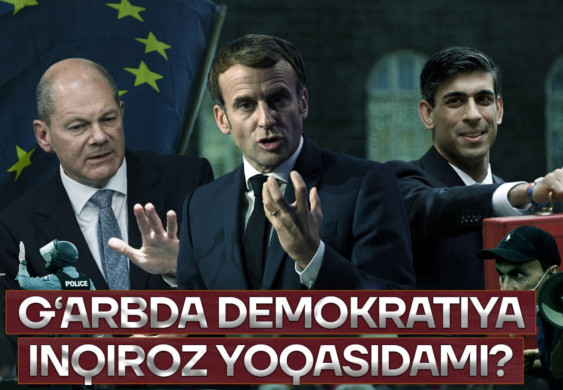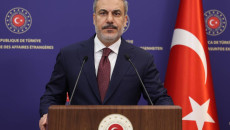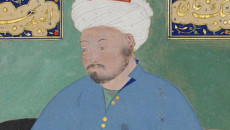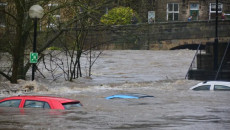The crisis of democracy in the West: 1 in 2 people are dissatisfied
Although the EU often issues democracy warnings to member states in Eastern Europe or applicant countries such as Turkey, the EU institutions themselves suffer from a "democratic deficit".
Director of the Paris Perspective Research Center (PARC) Dr. Nevzet Çelik wrote about the weakening of trust in democracy in the West using the survey data.
***
A State of Democracy survey published last month by the Institut Public de Sondage d'Opinion Secteur (Ipsos) and conducted in England, France, Italy, Sweden, Poland, Croatia and the United States (USA) shows that dissatisfaction with democracy in Western societies is at an all-time high. also showed an increase [1]. Nearly half of people in all countries surveyed are dissatisfied with how democracy is not working in their country on issues such as voting, power sharing, political functionality and income distribution.
What do the polls say?
According to the participants, in the last 5 years, the functioning of democracy in these countries has gradually deteriorated. In particular, in the US and France, 7 out of 10 people say that democracy has deteriorated in recent years. For example, a record high 73 percent of the French believe that democracy has deteriorated over the past 5 years. Another striking feature of the survey is that people in all countries believe that fundamental changes are needed to improve the current political system.
In the same survey, "How satisfied are you with the functioning of democracy in your country?" in the answers to the question; Only 28% of Britons, 24% of Italians and 29% of French were satisfied with the situation.
Furthermore, in all Western countries surveyed, people believe that the economy and financial system are rigged for the rich and powerful. This figure is 72% in Italy, 71% in Great Britain, 69% in France, and 67% in the USA. That is, people believe that the government and state leaders in their countries pay more attention to the interests of the rich and powerful.
In the study "Europeans and their values: between individualism and individualization", only a third of Europeans believe that their country is governed democratically and only 20% are satisfied with the functioning of the political system[2]. Another study conducted by the King's College London Institute of Politics shows that the majority of people in the United Kingdom think that the country's politics do not serve their interests[3]. The country ranks low in international ratings of satisfaction with the political system. Only 17% of UK residents said they were "very satisfied" with the country's political system. There is also record support for the idea of experts making political decisions instead of the government. The survey shows that people living in the country think democracy is a good system in theory, but most do not believe the UK has a high level of democracy.
Another 2023 survey of satisfaction with democracy in Germany by the Friedrich Ebert Foundation (FES) asked "How satisfied are you with the functioning of democracy in Germany?" 34% of Germans were dissatisfied with the question, and 17.2% were not satisfied at all. Although more than half of Germans say they are dissatisfied with the current democratic performance, DW [4] (Deutsche Welle) "focuses on the glass half full" and tells its readers "Germany: Confidence in democracy still high, according to poll". presented in the form of
In the same survey, according to the question "Trust in Institutions", trust in the federal government remained at 42.6 percent, and trust in the European Commission remained at only 31.5 percent.
According to a survey by the Körber Foundation [5], trust in democracy is rapidly declining in Germany. Citizens' trust in political parties was 29% in 2020, and in 2021 this indicator decreased to 20%. In addition, 71 percent of respondents believe that leaders and the media live outside the reality of society.
Politicians who came to power without election
The situation is no different in France. For example, prime ministers appointed by the president have been voted on by the National Assembly since 1993 and then take office. However, since Emmanuel Macron failed to obtain a majority in the parliament in the 2022 presidential elections, he appointed Elisabeth Borne (2022-2024) and Gabriel Attal as prime ministers without a parliamentary vote. In fact, shortly after his appointment, Attal appointed his ex-lover Stéphane Sejourne as Minister for Europe and Foreign Affairs.
According to tradition, Article 49 prim 3, which the constitution provides to the president, is used in cases where the debates have reached an impasse or an emergency situation has arisen first. However, Macron has repeatedly used Article 49 prim3 of the French Constitution to appoint Prime Ministers, as well as to pass a number of bills, especially since he failed to win a parliamentary majority in 2022 [6]. This practice is often criticized by other MPs and demands that the government adhere to democratic [7] principles.
The fragility of democracy at the national level in Europe has long been criticized through the bureaucratic structure and politics of the European Union (EU). Although the EU often issues democracy warnings to member states in Eastern Europe or to applicant countries such as Turkey, the EU institutions themselves suffer from a "democratic deficit". Although the European Parliament consists of elected representatives, the European Commission, the EU's most important executive body, proposes and implements laws, budgets and regulations. However, the commission is chaired by an appointed chairman. This is contrary to the notion that power in democracies is usually exercised by an elected parliament or a popularly elected president. In the EU, power is concentrated in an appointed leader and other appointed bureaucrats and technocrats of the Commission. Although the chair is approved by parliament, in practice the chair of the commission is usually determined in closed-door agreements between member states. [8] This situation also affects the voting process, which is a key indicator of democracy. Only 50.66% of EU citizens participated in the 2019 EU elections due to low trust in the Union.
The rise of the far right
While the EU has criticized other countries for human rights abuses in the past, it continues to turn a blind eye to the deaths of thousands of migrants in the Mediterranean by supporting Greece's efforts to build a migrant wall and pressuring Morocco. In the process, the EU has been criticized for acting against its democratic values by creating the border protection agency Frontex.
The greatest threat to democracy and peace in Europe is the rise of racism and the rise of racist and fascist political movements, as in the past. While far-right parties are enjoying a historic rise in France, they have won elections in Italy and, surprisingly, even in liberal democracies such as the Netherlands. In Germany, some politicians are worried about the rise of the far-right AfD party as the biggest threat to democracy [9].
As a result, European democracy is gradually moving away from the humanist, liberal and democratic values that were formed after the Second World War. Although trust in democracy in Europe remains at a theoretical level, it appears to be weakening in practice. The overwhelming majority of the European public is dissatisfied with the decline of democracy in their countries, which is clearly visible in the polls. As in France, "No matter who comes, nothing changes!" that people with such a mood tend not to vote, is opening the way to a big democratic crisis.
With more strikes and demonstrations, people who want to defend their rights against political elitism, administrators and bureaucracy are questioning the foundations of democracy. In addition, the rise of far-right movements in Europe is fueling fears of a return to fascist eras in European history. While the declining birthrate worries countries such as Italy, Spain and France, the strictness and nationalism of immigration policies run counter to European values.
The EU's bureaucratic and technocratic functionality in the decision-making process is incompatible with democratic values and undermines the trust of people in member countries. Europe needs to embrace its democratic values, increase people's voting tendencies and return to its humanist values regarding immigrants. There is an urgent need to address rapidly declining birth rates due to health care reforms and economic hardships and living conditions. It needs to be more effective in fighting racism, keep pace with the developing world and modernize its old bureaucratic structure. If European countries fail to take these steps, it is inevitable that they will become economically, socially and institutionally weaker than global competitors when they face a serious economic crisis.
[1] https://www.ipsos.com/en/heading-biggest-election-year-ever-satisfaction-democracy-low
[2] https://theconversation.com/are-europeans-really-democrats-211457
[3] https://www.kcl.ac.uk/news/uk-satisfaction-with-politics-internationally-low-but-support-for-democracy-has-still-risen
[4] https://www.dw.com/en/germany-trust-in-democracy-still-strong-survey-finds/a-65451290
[5] https://bitfinance.news/en/confidence-in-democracy-is-rapidly-declining-in-germany/
[6]https://consents.prismamedia.com/?redirectHost=https%3A%2F%2Fwww.caminteresse.fr&redirectUri=%2fsociete%2farticle-493-combien-de-fois-at-il-ete-utilise-par -le-gouvernement-11188915%2f
[7] https://twitter.com/LouisBoyard/status/1745154105322909844?s=20
[8] https://chicagopolicyreview.org/2023/10/09/the-eus-democracy-challenge-and-opportunity/
[9] https://www.dw.com/en/germany-afd-a-growing-threat-to-democracy-says-minister/a-67839373
Dr. Nevzet Chelik,
Director of the Paris Perspective Research Center (PARC).




.png)












